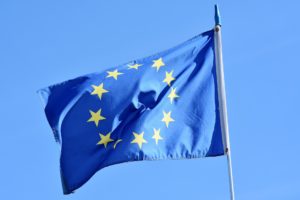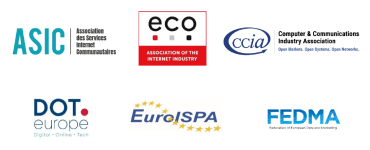Highlights from the Past Week
CW 43 / Monday, 24 to Thursday, 27 October: Committee Meetings Week (Brussels),
DATA ACT – EXCHANGE IN THE LEGAL COMMITTEE: At the meeting of 27 October, the MEPs of the associated Committee on Legal Affairs (JURI) held an exchange of views on the draft opinion of I. García del Blanco (S&D, Spain).
The rapporteur explained that his draft sought a better protection of trade secrets. He also wanted to clarify which databases would benefit from sui generis protection and which would not. Additional measures were inserted to reinforce protection against the illegal transfer of data.
The shadow rapporteur of the JURI Group (and LIBE rapporteur), S. Lagodinsky (Greens/EFA, DE), aligned himself with MEP K. Melchior and called for a balancing of trade secrets, stating that these should not be limitless or automatically granted. Furthermore, he advocated (also in his opinion, PDF) for the complete deletion of Chapter V of the proposal, which deals with making data available to public sector bodies and EU institutions, agencies or bodies based on exceptional need. (video)
Meanwhile, the plenary vote on the Data Act is scheduled for March – as announced by the Chair of the Industry Committee. (see Contexte, paywall, FR). In the ITRE Committee (video).
ARTIFICIAL INTELLIGENCE I – COUNCIL NEARING FINALISATION: The Czech Presidency received broad support for its latest compromise text on the Artificial Intelligence Act (19 October – PDF) following discussions in the Telecommunications Working Party last week.
Minor clarifications are expected, mainly related to the provisions on insurance and critical infrastructure in Annex III of the text. The final text of the regulation will now be presented in the next Working Party meeting on 8 November and is expected to be adopted by COREPER on 18 November.
Meanwhile, the US has approached some EU countries to push for a narrower AI definition, a broader exemption for general purpose AI and an individualised risk assessment. (see Euractiv)
ARTIFICIAL INTELLIGENCE II – WORK IN EP HALFWAY THROUGH: In an extraordinary joint committee meeting last week, D. Tudorache (Renew) reported on the status of the preparation of compromise amendments (PDF; video). In this regard, a large part of Chapter 3 on the obligations of providers and users of high-risk systems was finalised, as was Chapter 5 on standards, conformity assessment, certificates and registration, as well as Article 33 on notified bodies.
A majority was also reached on the issue of penalties and fines. On the topic of regulatory sandboxes, it is a matter of obliging each state to set up at least one such sandbox or at least to participate in an agency that connects several countries. As suggested by Tudorache, what still needs to be discussed is how the GDPR will be applied. Apart from these specific points, he acknowledged that the most difficult discussions on the trickiest topics were yet to come. (see Contexte, Paywall, FR; see also Euractiv)
UK – OFCOM QUESTIONING EU NET NEUTRALITY: UK regulator Ofcom announced a review of its net neutrality guidelines. Its proposals, which are open for consultation until 13 January 2023, include allowing premium packages and zero-rating offers, the development of new “specialised services” (content and applications that require an optimised Internet, such as virtual reality or autonomous vehicles) and the use of “traffic management” measures to avoid network congestion. Ofcom also proposes that ISPs can decide whether to offer free access to emergency call services and parental control devices.
On the infrastructure levy debate, the regulator says it has “not yet seen sufficient evidence that this is needed” and clarifies that such a decision would be “a matter for Government and Parliament”. Ofcom plans to publish its revised guidance in autumn 2023. (see Ofcom press release)
INFRASTRUCTURE DEBATE – SURVEY PRECEDES CONSULTATION: According to Politico Pro (paywall), Commissioner T. Breton has informed a group of European telecommunication CEOs that the Commission will send out a questionnaire to ICT companies on 21 December. However, according to the sources, the questionnaire should not be mistaken for the opening of a public consultation, which will still take place in early 2023.
The Commission is seeking to attain a more comprehensive view of how much money is exchanged between technology and telecommunications companies.
CSAM – JOHANSSON AFFIRMS FRANCE’S SUPPORT: A briefing for Commissioner Y. Johansson, as prepared for a meeting at the end of September with the French State Secretary for Children, Charlotte Caubel, was published by Politico Pro (paywall).
As set out in the minutes of the meeting, Caubel “reiterated France’s support for the upcoming legislation on preventing and combatting child sexual abuse, including the obligations on companies to detect, report and remove child sexual abuse online, and the creation of an independent EU Centre.”
France’s “concern” about “preserving existing mechanisms” to combat child abuse content online was raised in discussions on the proposal between the Commission and the Council of the EU, according to a 12-page memorandum (PDF) written for Johansson, which also describes the regulation as a “priority” for the French government.
The Home Affairs Commissioner assured, among other points, that the draft law “does not replace the important work that child sexual abuse hotlines do today”. The document refers in particular to France’s “Point de Contact” and the Pharos platform, two existing contact points for reporting illegal content online.
DIGITAL MARKETS ACT I – NEW DIRECTION IN COMMISSION: The European Commission’s competition department will establish a new directorate that will deal with the DMA enforcement and handling of all antitrust cases related to digital companies. For this purpose, the case handling unit and the DMA task force are to be merged and increased to forty officials. Alberto Bacchiega, the current director for ICT antitrust cases, will also head the new directorate until a new director is appointed for one of the two directorates. (see Euractiv)
DIGITAL MARKETS ACT II – COMMISSION BEGINS WORKSHOPS: The EU Commission workshop, as announced in last week’s View from Brussels, will take place on 5 December. Interested parties can register on the Commission’s website (see EU Commission).
ECJ – LEGALISATION OF IDENTITY DATA LINKED TO IP ADDRESSES: In his Opinion, the ECJ’s first Advocate General, Maciej Szpunar, concludes that a national authority should be able to access civil identity data linked to IP addresses where such data are the only means of investigation enabling the identification of the holders of those addresses suspected of online copyright infringement.
In his view, such a proposal fully complies with the requirement of proportionality and ensures respect for the fundamental rights guaranteed by the Charter. (C-470/21; ECJ press release – PDF)
GERMANY – MINISTRY OF THE INTERIOR CONSIDERS QUICK-FREEZE INADEQUATE: Federal Minister of the Interior, N. Faeser considers the proposal submitted by Minister of Justice M. Buschmann for a procedure for securing telecommunications data limited to specific suspicious cases to be inadequate. “The Quick Freeze procedure newly regulated in the draft can be used as an accompanying instrument in specific cases of application and provide important investigative findings,” she said. However, it is “not an adequate substitute for the retention of IP addresses”.
Faeser urged that, “the basis of our actions should be the supreme court case law of the European Court of Justice”, and added that “we should implement what the ECJ has explicitly declared to be compatible with our fundamental rights and what is urgently needed for combatting serious crime”. (see Table Europe, paywall – DE or Die Zeit – DE)
GERMANY – FURTHER CRITICISM BY DATA PROTECTORS ON PRIVACY SHIELD 2.0: If an internal assessment by the data protection commissioner of Baden-Württemberg, Stefan Brink, is correct, then companies will have to wait even longer for a viable solution for their transatlantic data traffic. He does not assume that the decree recently presented by US President Joe Biden will stand up to the strict requirements of the European Court of Justice (ECJ). (see FAZ – DE and heise.de – DE)
GERMANY – STRONGER ENERGY TARGETS FOR DATA CENTRES PLANNED: The operators of data centres and other IT facilities are to be subject to stricter climate protection requirements as well as auditing obligations in the future, according to an unpublished draft of an “Act to Increase Energy Efficiency, Improve Climate Protection in Emission Protection Law and Implement EU Law” by the German Federal Ministry for Economic Affairs and Climate Action (BMWK), parts of which are to apply as early as 2024. (see heise.de – DE or eco press release)
DIGITAL SERVICES ACT – PUBLICATION IN THE OFFICIAL JOURNAL: On Thursday last week, the Digital Services Act (DSA) was published in the Official Journal of the EU.
Following its adoption by the Council on 4 October 2022, Regulation (EU) 2022/2065 on a Single Market for Digital Services and amending Directive 2000/31/EC (Digital Services Act, DSA) was published in the Official Journal of the EU on 27 October 2022. It will enter into force twenty days after its publication, i.e. on 16 November 2022.
The Regulation shall apply from 17 February 2024, with the exception of Article 24(2), (3) and (6), Articles 37 (7), 40 (13) and 43 and Sections 4, 5 and 6 of Chapter IV, which shall already apply from 16 November 2022.
The Regulation sets new rules to ensure the protection of the digital sphere against the distribution of illegal content and the protection of users’ fundamental rights, as it defines clear responsibilities and accountability for providers of intermediary services.
DATA PROTECTION – EDPB SEEKS NEW CHAIR: The chair position of the European Data Protection Board (EDPB) is up for grabs. The current Chair, Andrea Jelinek, told MLex this week that she will not stand for re-election when her term expires in May next year.
Relevant Publications, including from the EP Think Tank:
- Outcome of the European Council meeting of 20 – 21 October 2022 (Briefing)
- The 2022 US mid-term elections: Legislation meets politics (Briefing)
- eIDAS 2.0: Digital Identity Services in the Platform Economy (Issue Paper by Cerre)
Outlook for the Current Week
You can find a list of the upcoming dates of the European Parliament here. The meeting calendar for 2022 can be found here (PDF).
An overview of the most important dates of the Council week can be found here and the meeting calendar can be accessed here. You can access the official calendar of the Czech Presidency here (PDF).
Included among these dates are:
Summits and Ministerial Meetings:
- None
Preparatory Bodies:
- Law Enforcement Working Party – Police (incl. CSAM), Thursday, 3 November;
- Working Party on Judicial Cooperation in Criminal Matters (COPEN), Friday, 4 November;
- COREPER I (incl. Chips Act), Friday, 4 November;
- COREPER II, Friday, 4 November;
Information on the weekly Commission meeting can be found on the Commission’s website in the preview (PDF) or (at short notice) in the current agenda. No meeting will take place this week.
You can find the judicial calendar of the ECJ here. This week is a court recess.
European Parliament Committees
CW 44 / Monday, 31 October to Friday, 4 November: Green Week (no meetings);
LIBE Committee (Civil Liberties)
Current Meetings
- None
Further Meetings (Calendar)
- Monday, 7 November, 15.00-18.30 (Brussels)
- Tuesday, 8 November, 9.00-12.30 and 14.30-18.30 (Brussels)
JURI Committee (Legal Affairs)
Current Meetings
- None
Further Meetings (Calendar)
- Thursday, 17 November 2022 (Brussels)
- Monday, 28 November 2022 (Brussels)
- Tuesday, 29 November 2022 (Brussels)
Dossiers Timetable (5 October 2022)
ITRE Committee (Industry)
Current Meetings
- None
Further Meetings (Calendar)
- Monday, 14 November 2022, 15.00-18.30 (Brussels)
Dossiers Timetable (18 October 2022)
IMCO Committee (Internal Market)
Current Meetings
- None
Further Meetings (Calendar)
- Open
Dossiers Timetable (October 2022)
CULT Committee (Culture)
Current Meetings
- None
Further Meetings (Calendar)
- Monday, 14 November 2022 (Brussels)
PEGA Committee (Pegasus Committee of Inquiry)
Current Meetings
- None
Further Meetings
- Monday, 14 November 2022, 15.00-18.30 (Brussels)
INGE2 Committee (Special Committee on Foreign Interference)
Current Meetings
- None
Further Meetings (Calendar)
- Open
Further Parliamentary Calendar Dates
- CW 45 / Monday, 7 to Thursday, 10 November: Mini-Plenary Sessions Week (Brussels);
- CW 46 / Monday, 14 to Thursday, 17 November: Political Group and Committee Meetings Week (Brussels);
- CW 47 / Monday, 21 to Thursday, 24 November: Plenary Sessions Week (Strasbourg);




